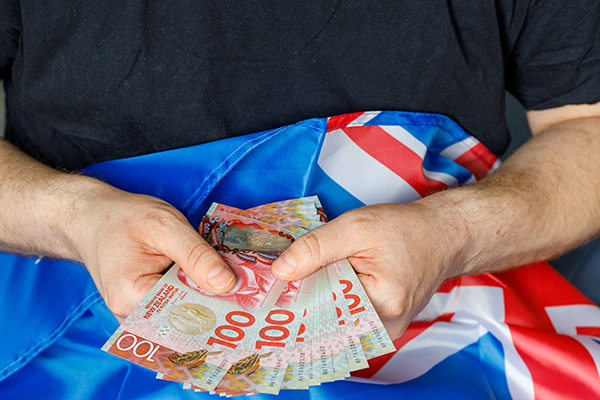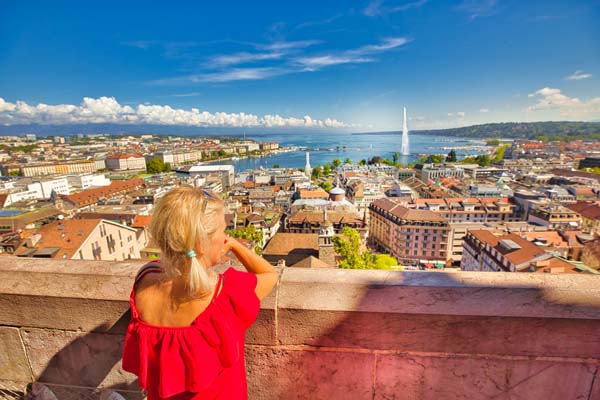
What Are the Most Expensive & Safest Countries to Live in the World?
There’s no experience as exciting or enriching as living abroad. Not only does it give you the opportunity to find yourself, but it also lets you see places and have experiences you’d never have by staying at home. But of course, before you pick a destination and pack your bags, you should have an idea of how much you can afford and how much you’re willing to spend living abroad, as some countries are more expensive to live in than others. While all the countries we’ve listed below have strong social safety nets, a high quality of life and have a reputation as being some of the safest countries in the world, those benefits can often come with a hefty price tag.

Based on our findings, here are some of the most expensive and safest countries to live in around the world. You can jump to the sections in this guide below:
Most Expensive & Safest Countries to Live in Asia
As the largest continent in the world, Asia offers broad cultural diversity, breathtaking landscapes, humble citizens and some of the best street food you’ll ever have. While Asia is home to some of the cheapest countries to live in, it has some more expensive ones in the world as well. Here are a few places that are a bit more costly:
Singapore
Singapore often ranks as one of the most expensive countries in Asia and the world.

Housing
A larger rental unit can cost around $2,400 USD per month, per data from Expatistan, a cost-of-living index site. Of course, if you would share that space with a roommate or significant other, you’d only be paying $1,200 USD per month in that scenario. If you’re living entirely on your own, you can get a smaller rental unit for around $1,900 USD per month.
Food
But when it comes to dining out and grocery shopping, prices aren’t too high. Dining out should only cost around $12 USD per person. For groceries, a single person may end up paying $200 USD per month, according to GuideMeSingapore. At the same time, certain grocery items may cost more than others. The Singapore Food Agency, a board overseeing food safety in Singapore, says the small city nation and state only has about 278 square miles of land for land-based food farming. As a result, certain grocery items like fresh produce, fresh eggs, certain meats and fish can be more expensive.
Transportation
While Singapore can be expensive, this study from McKinsey & Company, a consulting firm that advises governments, found that Singapore has one of the most efficient and affordable public transit systems in the world:
Singapore’s electronic road-pricing system is powered by a digital device that automatically charges the driver the road toll when the car passes through a gantry, enabling frictionless road travel for both private and public vehicles, even during peak times.
A single ride costs around $2.75 USD. In New York City, the subway can cost around $2.75 USD and bus rides can cost almost $7 USD.
There’s no doubt that Singapore has great transportation and other amenities. However, that money must come from somewhere, which partially explains why the country has such high taxes.
Taxes
Singapore is known for its very progressive tax system. The Inland Revenue Authority of Singapore, Inland Revenue Authority of Singapore, Singapore’s tax collection agency states personal income tax rates range around 22%.
Jobs
High taxes won’t eat up too much of your income here if you have a good-paying job – and there is plenty to go around. Demystify Asia, an Asian business information publication, says companies like LinkedIn, Microsoft, Apple and Google all have regional offices in Singapore and are known for paying their employees well.
As Singapore has a reputation for being internet-friendly, you don’t have to be a big tech worker to find a solid job here. In fact, you can have a job anywhere and continue to do it living in Singapore. According to NIKKE Asia, another Asian business information publication, Singapore is one of the top places for digital nomads to live and work in Singapore.
Have you considered the digital nomad life? Check out WorldSmart’s guides on becoming a digital nomad to see if it’s the right move for you.
Safety
Additionally, Singapore prides itself on being one of the safest places to live worldwide. Singapore government data shows that 94% of its residents feel safe walking alone at night.
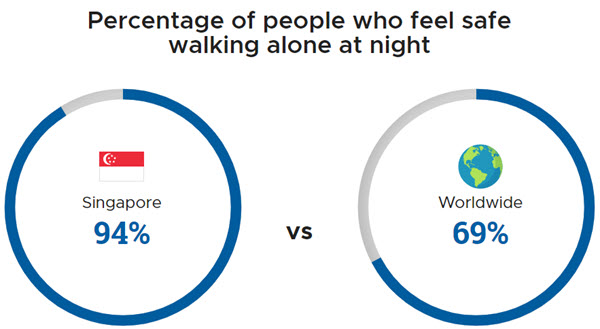
Its robust police camera system in public areas has helped limit the frequency of petty theft and violent crimes. Although Singapore has seen slight upticks in criminal activity recently, the Overseas Advisory Security Council, a sector of the US State Department that provides safety information about other countries, Singapore is still considered one of the safest places to live by its OSAC Crime and Safety Report.
Japan
While Singapore holds the title for most expensive countries in Asia, Japan doesn’t fall too far behind.
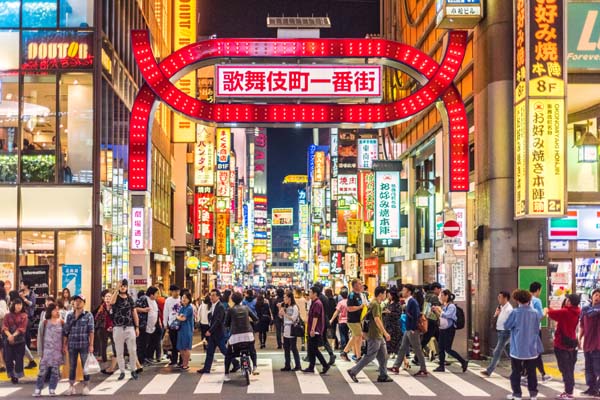
Housing
LiveJapan, a website that provides information for people visiting and moving to Japan, says living in the island nation costs about three times more than living in the United States. Rent for a 1-bedroom apartment in Japan isn’t outrageous, with average costs around $700 USD per month. Of course, if you decide to live in Tokyo, you may be paying closer to $2,200 USD per month.
Food
Food in Japan tends to be more expensive as well, as a lot of it must get imported. Expatistan, a cost-of-living index site, says the average meal at a restaurant may cost you around $30 USD per person. When it comes to grocery prices, basic produce, eggs, chicken, bread and milk may cost around $23 USD per week. If you want any alcohol with your meal, a beer will cost you around $2.40 USD and a bottle of wine will cost around $15.70 USD.
Transportation
Like Singapore, Japan is also known for fast, efficient and affordable public transit. A one-way ticket for Tokyo’s metro will only cost you $1.50 USD. But if you’re traveling a greater distance, you may end up taking the bullet train which can cost more than $100 USD, depending on your end destination.
Safety
There’s no doubt that life in Japan can come with a hefty price tag. But at the same time, it’s also one of the safest countries in the world. The Global Peace Index, a report produced by the Institute for Economics & Peace, listed Japan in the top 20 of its safest countries in 2021.
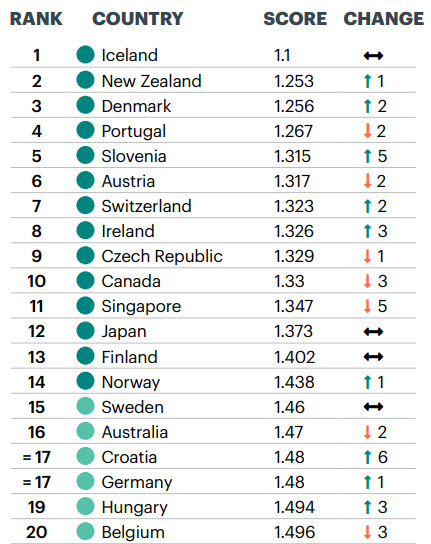
An article from Intrepid, a website that hosts tours and other global adventure activities, says those who move to Japan are stunned at how low the country’s crime rates are, even for nonviolent offenses like petty theft; it’s quite common to see locals leave their belongings unattended at cafes, bars and other public places.
Most Expensive Countries to Live in Europe
Known for its rich history, distinct landmarks, world-class dining, entertainment and culture, many Americans move to Europe to find themselves and their roots. Plus, many European countries, including the ones listed below, are some of the safest in the world, according to the Global Peace Index. Of course, such amenities and perks can make these countries more expensive than others, so if you’re planning on moving to Europe, these places can really shrink your spending power:
Switzerland
Located in the heart of Mainland Europe, Switzerland is known for its snow-capped Alps, decadent chocolates and state-of-the-art gadgets. It’s also the most expensive place to live on the continent. Switzerland is a wealthy nation with a booming economy, a hot real estate market and high tax rates.

Housing
Cities like Zurich and Geneva are often listed as two of the most expensive in the world, with rents ranging anywhere from $1,600 USD to $2,200 USD per month. A former Swiss expat and Youtuber, Danica Christin, talks about how it isn’t much cheaper outside major metros. However, she mentions that what you pay doesn’t always impact the quality.
When I lived in Switzerland, I saw pretty nice rooms, share houses and shoebox studio apartments go for around $500 and other places that are bigger places that aren’t as nice go for a lot more. It’s really a wildcard.
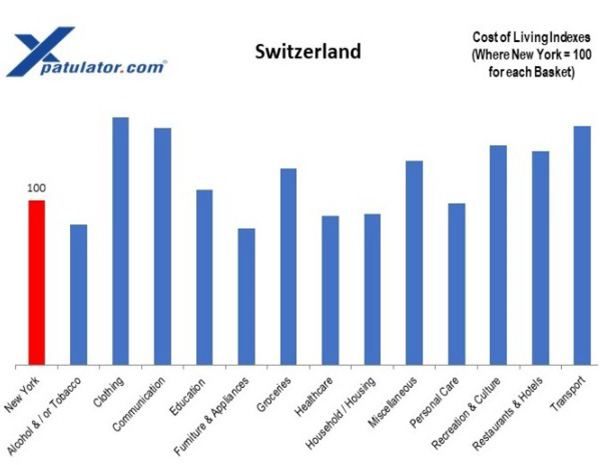
Food
Groceries are also expensive. Like many other high-cost countries, Switzerland must import a lot of food, resulting in price increases. Plus, according to swissinfo.ch, a website that provides information about life in Switzerland, the Swiss government places high tariffs on food and beverages to protect local farmers from international competitors:
High Swiss tariffs on food and drink imports are designed to protect local farmers who generally have smaller farms than international competitors and the steep costs of ‘high price island’ Switzerland.
You can expect to spend around $100 USD per week on basic food items. If you’re looking to dine out, expect to pay a lot for your meal. A 7.05oz steak could cost you around $38 USD in Switzerland, while that same size steak may only cost you about $23 USD in Germany.
Health Care
Health care also plays a role in Switzerland’s high cost of living. Expatica says that like the United States, most people in Switzerland have private health insurance with deductibles, copays and premiums. But unlike the United States, Swiss health insurance is mandatory for all citizens. Average health coverage premiums can cost around $400 per month, but can vary based on the canton (Swiss state) you live in. Standard private health insurance can cover basic medical needs, but you can also buy top-up packages if you need additional coverage.
If you find you need additional medical coverage while in Switzerland, you can purchase affordable and customizable international health insurance from Clements Worldwide.
Transportation
Switzerland also has some of the most comprehensive public transportation in Europe and the world. However, it’s also pricey. Taking the tram in a city like Geneva may cost you around $2 USD, per information from the US News and World Report, an organization that publishes consumer advice. And wanderu.com, a site that lets you purchase Swiss train tickets states an average train ride cross-country can cost around $82 USD.
Safety
While it can cost a pretty penny to live in Switzerland, it also has a reputation for being one of the safest countries in the world. While petty theft can be common in some major cities, violent crime is low. The Overseas Security Council states that Switzerland is a low-threat location and that people only need to exercise normal levels of precaution.
Iceland
A small island nestled between the North Atlantic and Arctic Oceans, Iceland is a popular destination for many expats due to its laid-back lifestyle, robust social welfare system and proximity to mainland Europe and the US. However, it’s also among the most expensive countries in Europe.

Housing
Rent prices aren’t as high, with one-bedroom apartments in Reykjavik starting around $990 USD a month, per data from the Iceland Review, an English language magazine that provides info on Iceland.
Food
Restaurants and groceries, however, can really eat at your wallet. Most foods must be imported due to Iceland’s lack of fertile land. According to Thoughtcard.com, a website that evaluates living costs abroad, you can expect to spend around $19 to $24 USD for breakfast; $20 to $35 USD for lunch and $25 to $40 USD for dinner.
Alcohol
Alcohol costs a lot too. The country has an 84.4% tax on alcohol it’s one of the most expensive things you can buy in the country.
Transportation
Unlike many European countries, Iceland does not have its own public train system, so the best ways to get around are by car or by bus. Walking or biking are also viable options if you live in the city. A one-way bus ticket can cost you around $3.60 USD and if you decide to drive, gas costs around $6 USD to $7USD per gallon.
Quality of Life
Despite high living costs, Iceland is an all-around great place to live. The Organization for Economic Co-operation and Development (OECD), an intergovernmental economic organization, put Iceland right at the top of its Better Life Index because of its high wages, job opportunities, environmental quality and strong social connections:
In general, Icelanders are more satisfied with their lives than the OECD average. When asked to rate their general satisfaction with life on a scale from 0 to 10, Icelanders gave it a 7.5 grade on average, much higher than the OECD average of 6.5.
Safety
Iceland is listed as the safest country in the world by the Global Peace Risk Index. An article from Tripsavvy, a vacation planning website, states violent crime in Iceland is practically nonexistent — even petty crimes like robbery and pickpocketing are rare.
Luxembourg
While it is small, it can cost a pretty penny to live in Luxembourg.

Housing
The country’s housing shortage makes it one of the most expensive places to live in Europe. Rent here can vary between $1397 USD and $3384 USD a month, per data from NUMBEO, a site that provides cost of living information for different countries. And according to the EU statistics agency, Eurostat’s data, nearly 70% of people own their homes, which, the Luxembourg Times, a Luxembourg news publication, shared some rental tips as they discuss the challenges of finding a place to rent:
A study by estate agent atHome in March 2020 found that prices for rental properties had increased by 6% over the previous 12 months. Whilst this might seem steep, the cost of buying an apartment had gone up by 15% over the same period.
Food
Luxembourg is filled with luxury restaurants, bars, and cafes, which aren’t always cheap. Dining out can cost between $12 USD and $34 USD, per data from NUMBEO. Grocery stores in Luxembourg can also be very expensive. However, because Luxembourg is such a small country, some residents buy their groceries in neighboring countries like France, Germany or Belgium to save money. This gives new meaning to the phrase, “Honey I’m running out to the store.”
Taxes
Luxembourg provides free public transportation, including trams, trains and buses to residents and tourists. Although, these free systems are paid through an expansive and progressive tax bracket.
Those progressive taxes also subsidize the country’s schools. The Borgen Project , a nonprofit devoted to fighting global poverty, says Luxembourg has one of the best education systems in the world and sets high standards for student success:
According to reports made in 2011, 77% of people in Luxembourg have at least an upper secondary education. This is equivalent to a high school education. The number exceeds the OECD average of only 75%. The younger generation is excelling even further, with 83% of 25-34 year-olds having completed a high school education.
Teachers are well-paid here and students are required to learn multiple languages.
Safety
Additionally, Luxembourg is safe to live in as well. Data from Macrotrends, a research platform for investors, shows the country had only 0.34 crimes per 100,000 people in 2017, a 60.85% decline from the previous year.
Most Expensive Countries to Live in North America
Some of these might come as a surprise. The region’s tropical islands are small, but living in them can take a sizeable chunk out of your bank account:
The Bahamas
Located in the heart of the Caribbean, the Bahamas is a tropical hotspot and ranked as among world’s most luxurious travel destinations. It’s also gained a reputation as a tax-haven with high-income earners from around the world, as the country doesn’t have income or capital gains taxes.
The standard of living here is also quite high, but because it’s an island country, everything must be imported, making it an expensive place to live.
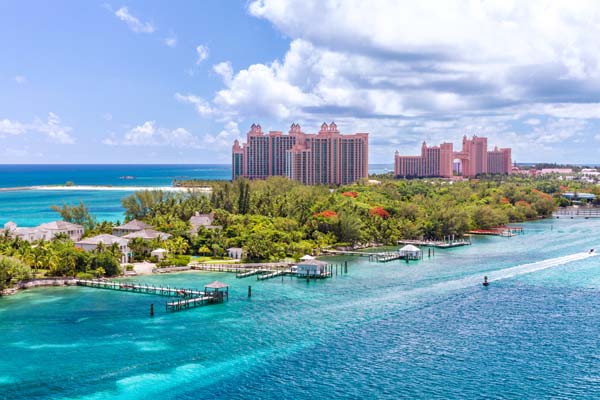
Housing
How much you pay for rent can all boil down to where you decide to live in the Bahamas. For example, you can find one-bedroom or studio apartments for under $1,000 USD per month if you live in a less luxurious area. If you’re looking for beachside views and bar access right outside your front door, you can expect to pay around $2,700 USD per month and above.
Food
A months’ worth of groceries in the Bahamas will cost you about $45 USD a day. A months’ worth of groceries in the Bahamas will cost you about $45 USD a day. For dining out, expect to spend around $18 USD per person. And when you’re dining out in the Bahamas, expect to pay a value-added tax (VAT) on top of your meal. KPMG, one of the largest accounting firms in the world, says the Bahamas has a standard VAT of 12%.
Transportation
Public transportation in the Bahamas isn’t the most reliable, so the best way to get around is by car. If you choose to drive, gas is around $5.28 USD per gallon, according to globalpetrolprices.com, a website that provides data about international gas prices. It’s much higher than the United States’ national average gas price, which AAA says gas is around $3.31 USD per gallon.
Safety
Unlike a lot of other expensive countries, the Bahamas has some more dangerous areas. According to the US State Department, most crime occurs on the New Providence and Freeport Islands. But if you move closer to the tourist-y areas, your chances of running into trouble are much lower.
Bermuda
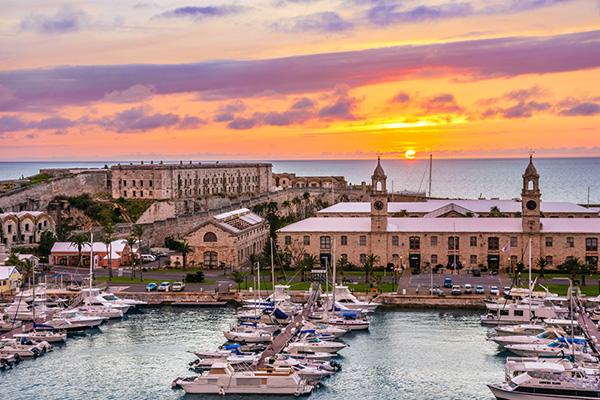
People flock to Bermuda for its historic towns and pink sandy beaches. But when you factor in daily living costs, The Royal Gazette, one of Bermuda’s largest news publications, says living on the island is much more expensive than living in the US:
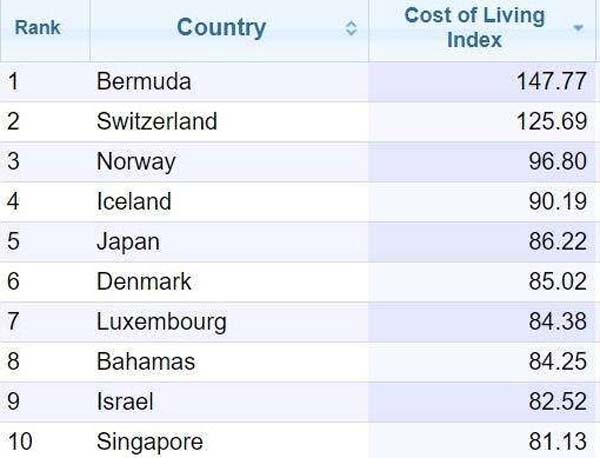
Housing
Data from NUMBEO shows rent in Bermuda can range anywhere from $3000 USD to $6000 USD per month. That means you would need to make approximately $15,000 USD per month to live comfortably here.
Food
Like other island countries, Bermuda must import a lot of their food, making groceries pricier. Individuals living in Bermuda can expect to pay around $85 USD per week for basic grocery items. If you want to add any alcohol to your grocery list, imported beer runs around $6 USD and domestic beer runs around $5.50 USD; a bottle of wine can cost around $23.50. Plus, Bermuda isn’t shy about its high sugar taxes, per this press release from Government of Bermuda’s website. So, if you plan on buying lots of sweets while living in Bermuda, prepare to spend a little more than usual.
Transportation
Since there are strict rules around owning a car in Bermuda, buses are the safest and most reliable form of transportation. But unlike other places, bus rides here can be quite spendy. Day bus fares can cost anywhere between $25 USD and $75 USD for adults and $9.50 USD for children, according to the Government of Bermuda.
Safety
While it can be expensive, Bermuda has a significantly lower crime rate than a lot of places in the United States. If it does occur, it typically involves inter-gang violence. However, petty crimes like robbery and pickpocketing can and do happen, so remain vigilant when you’re out and about.
USA and Canada
If you’re not from North America and considering moving to either the United States or Canada, you may hear on the news how expensive certain parts of each country can be, but because each is so large, the cost of living can vary significantly in both rural areas and large cities.
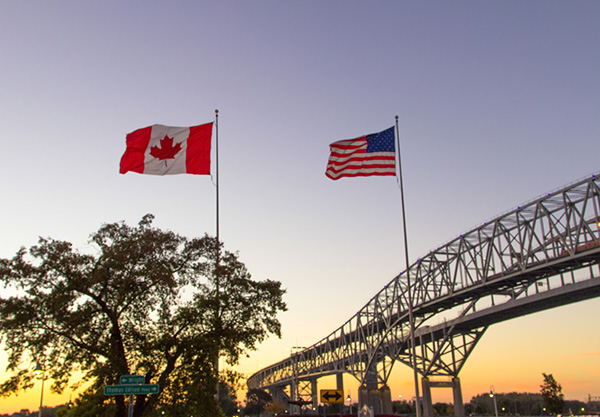
For instance, if you plan on moving to a state like California in the US, you can expect to pay between $1,500 USD and $5,000 USD for rent, according to rentdata.org. Groceries in California can cost you around $250 USD per month. If you live in a big city like Los Angeles, transit passes can cost you around $100 USD per month. And according to a recent report from California Public Radio, living in rural California is still quite expensive:
“That came as a big surprise because historically we have thought of the housing problem as being a focus in larger cities, but we found every city has this problem,” said Jonathan Woetzel, director of the McKinsey Global Institute and a co-author of the study.
However, if you move to a state like Oklahoma, living costs are significantly cheaper. Salary.com says if you live in Oklahoma City, the state’s largest metro, would cost you less than half of what it would take to live in Los Angeles.
And if you plan on moving to Canada, a big city like Toronto is a lot more expensive than living in a smaller one like Winnipeg. Even though monthly rent is dropping, you can still expect to pay around $1,400 USD per month for rent in Toronto. Groceries in Toronto cost around $340 USD per month and public transportation costs around $263 USD per month.
In Winnipeg, average rents around $1,000 USD per data from zumper.com, a site that shows available rental units in Winnipeg. Groceries in Winnipeg can be a bit more expensive, averaging around $698 USD per month. Public transportation in Winnipeg costs around $2.50 USD, and if you plan on driving there, you can expect to pay just around 99 cents for a quarter tank of gas.
Finding the right place in either country can be a lot to think about, so make sure to do your homework before moving abroad to your desired destination. Many expats go though culture shock when they move to another country, so as you plan your move, also consider the cultural differences and what you are comfortable with.
Check Your Budget Before You Go
If you’re considering moving abroad, gain a solid understanding of where you can afford to live. If you have the salary and the job security, go for it! If you don’t, that doesn’t mean you have to forego your dreams. You may just have to plan ahead, especially if you’re moving to any of the countries we listed.
If you’re still unsure of where to go, check out this other article showcasing the most and least welcoming countries for expats!
For more information and help ;on relocation, join the World Smart Association and become a member of a global network of travelers.








